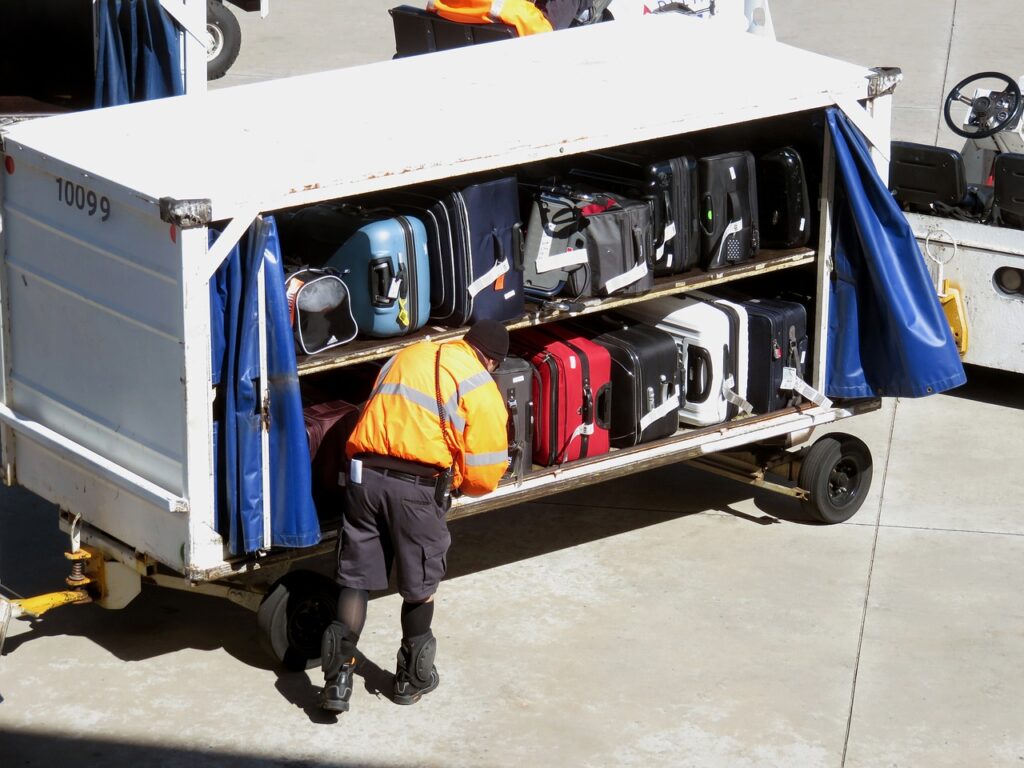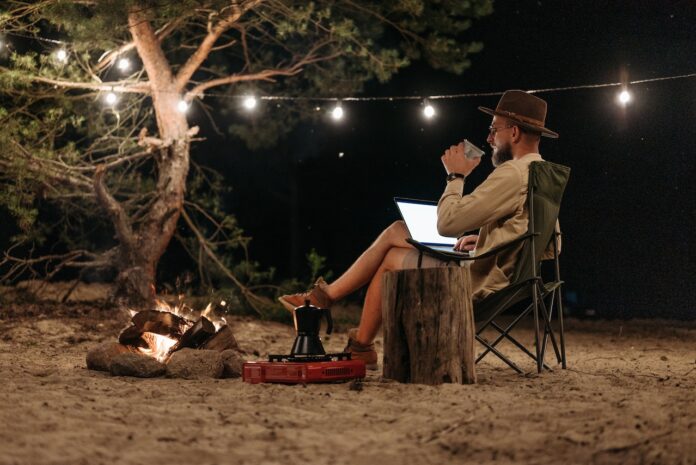A workcation is the latest trend blending work and vacation. It offers professionals the chance to be productive while exploring a new destination. This guide will cover everything you need to know about workcations.

What is Workcation and its meaning?
A workcation is a working vacation that combines remote work with leisure travel. It allows professionals to productively work at their job while enjoying a change of scenery in a vacation destination.
Unlike bleisure trips which extend business travel for fun, workcations are planned remote working holidays. The portmanteau “workcation” combines “work” and “vacation.”
On a workcation, the traveler dedicates a set amount of time each workday for their professional responsibilities, such as calls, emails, projects etc. The rest of the time is free to enjoy vacation experiences.
How Can You Make the Most of Your Workcation?
To maximize your workcation, follow these tips:
- Set expectations with your manager about working hours and availability before leaving
- Choose a suitable destination with reliable WiFi, suitable workspace and convenient time zone
- Travel during slower work periods when taking time off is easier
- Stick to a schedule balancing work and leisure to stay productive
- Block time for work without distractions to maintain focus
- Fully unplug after work hours to enjoy vacation experiences
- Take advantage of weekends and days off for extended sightseeing
- Use productivity tools like calendars, to-do lists, etc. to manage work
- Keep co-workers updated on your availability and delegate work as needed
- Avoid over-scheduling activities to prevent burnout

Why Is Workcation Important?
There are several key reasons why workcations have become an important trend:
- Less Burnout: Being in an inspiring new environment can boost morale, creativity, and energy while reducing work-related stress and burnout.
- Better Work-Life Balance: Workcations allow professionals to blend work with leisure on their own terms for better work-life harmony.
- Increased Productivity: Employees often report increased focus and productivity when workcating by minimizing office distractions.
- Employee Retention: Offering workcations shows employees they are valued. Flexible remote work options are linked to better retention.
- Destination Appeal: The chance to work while visiting a desirable vacation destination is a major motivation for today’s workforce.
- Post-Pandemic Lifestyle: Workcations align with broader workspace trends towards location independence and work/life integration emerging after COVID-19 restrictions.

Who Should Consider a Workcation?
Workcations can be suitable for various professionals, including:
- Remote workers or digital nomads with location-independent roles
- Project teams needing focused collaborative time together
- Companies in industries like tech that offer work from anywhere flexibility
- Travel industry professionals like influencers or travel journalists
- Employees needing a change of environment from burnout
- Individuals who can work remotely or negotiate temporary remote arrangements
- Couples or friends wanting co-working getaways
- People with flexible schedules or slower periods at work
- Self-employed entrepreneurs seeking inspiring destinations
As long as you have a remote-friendly job and manager approval, a workcation can be a viable option for blending work and leisure.
Who Can Benefit from a Workcation?
Many groups can benefit from planning a workcation:
Employees gain morale, enjoyment, productivity, and work-life balance.
Managers and Companies see boosts in employee retention, satisfaction, collaboration, and innovation.
Freelancers and Remote Workers access destination inspiration and lifestyle flexibility.
Groups and Couples bond through co-working vacations.
Families spend quality time together while enjoying new scenery.
Individuals recharge creativity, reduce burnout, and stimulate productivity.
Travel Industry Professionals create fresh travel content.
Digital Nomads discover new remote work communities and destinations.
Students and Academics further studies in an inspiring location.
Overall, workcations offer valuable benefits for 21st century professionals and organizations seeking to evolve work paradigms.

What Are the Benefits of a Workcation?
The potential benefits of taking a workcation include:
- Avoiding burnout by escaping routine and finding renewed motivation
- Exploring a new destination fully while still working
- Improved work-life balance and quality time for yourself
- Boost in mood and morale from a change of environment
- Increased focus and productivity by eliminating office distractions
- Fostering creativity and problem-solving skills with a fresh perspective
- Opportunities for team bonding and collaborating in inspiring locations
- Strengthening relationships by co-working with a partner or friend
- Gaining global experience by experiencing new cultures
- Saving vacation time for future trips
- Showcasing company culture and remote work capabilities
- Uncovering undiscovered travel destinations ideal for remote work

What is an example of a workation?
Some real-world examples of workcations include:
- A social media manager works mornings then explores Hawaii’s outdoors each afternoon
- An author spends a month writing in a Vermont cabin in the fall foliage
- A software engineer works UK hours from a villa in Tuscany for two weeks
- A travel blogger curates content while island hopping in the Caribbean
- A marketing team holds a week-long offsite in Bali with half days dedicated to brainstorming sessions
- A company offers employees an annual month-long work sabbatical option to promote creativity
- A business consultant unwinding from a project works remotely from Cinque Terre with hiking breaks
- A freelance graphic designer finds inspiration while creating in the cafes of Paris
- A tech startup holds an annual retreat for its remote workers in destinations like Prague
The options are endless for combining productive remote work time with inspiring travel experiences!

What is the advantage of Workcation?
Significant advantages of workcations include:
- Increased productivity and creativity by removing office distractions
- Improved morale, motivation, and energy through a change of environment
- Reduced employee burnout and work-related stress
- Stronger work-life balance and quality personal time
- Destination inspiration to combat routine and recharge
- Company perks and incentives that improve worker satisfaction
- Showcasing workplace flexibility and progressive work culture
- Remote team bonding through group co-working trips
- Experiencing new cultures and perspectives through global work travel
- Blending passion for travel with professional responsibilities
- Saving vacation time for pure leisure while still getting away
- Creating content and gaining industry knowledge as a travel blogger or influencer
The blend of work obligations and vacation freedom makes workcations an optimal choice for the modern workforce.
What are the different types of workcation?
There are a few main types of workcations:
Short-term workcations: These last from a long weekend up to 1-2 weeks. Popular for individuals or couples needing a quick remote getaway.
Medium-term workcations: Typically 2-4 week working holidays allowing for deeper immersion and location-hopping.
Long-term workcations: 1 month or longer co-living and co-working experiences. Common with digital nomads and people working abroad.
Nearby workcations: Traveling a short distance close to home, such as camping nearby while remote working.
Faraway workcations: Long-haul travel to bucket list destinations in other countries and continents.
Group workcations: Co-working trips organized for teams, departments, or companies.
Bleisure workcations: Extending business trips by working remotely after conferences or events.
Annual workcations: Companies offering employees recurring workcation allowances such as 1 month per year.

What are the facts about workcation?
Interesting facts surrounding the workcation trend include:
- In 2021, 74% of remote workers said they would consider taking a workcation according to a Harris Poll for Scandic Hotels Group.
- 80% of workcationers report improved productivity on workcations in research by Allwork.Space.
- 47% consider flexibility for remote work and workcations essential for not quitting according to Mercer’s Global Talent Trends study.
- 55% of employees say paid workcation benefits would improve happiness and retention according to research by Culture Amp.
- The average nightly hotel price in major U.S. cities drops 30% or more in summer – ideal for domestic workcations.
- Mexico, Thailand, Costa Rica and Portugal rank among the top destinations for international remote work and digital nomads.
- 91% of workers who took paid “work and wander” trips through Remote Year’s RY Passport were less likely to quit.
Should you take a workcation?
Deciding if a workcation is right for you depends on several factors:
Your job: Consider if your role and responsibilities are suited to remote work. Discuss feasibility and expectations with your employer.
Travel style: Workcations appeal to those who enjoy blending work and leisure. If you prefer complete separation, traditional vacations may be better.
Personality: Self-starters who can balance autonomy with discipline thrive most on workcations. Without structure, some struggle to stay productive.
Circumstances: Assess your budget, schedule flexibility, trip companions (solo, partner, group), and personal needs. Workcations have wide appeal but aren’t one-size-fits-all.
Purpose: Clarify your motivation and intended benefits. Recharge from burnout? Extended travel? Company retreat? Align goals to choose the right work+travel balance.
Consider your specific situation to decide if incorporating work will enhance—or hinder—the experience.

How much does Workcation cost?
Workcation costs vary widely depending on destination, trip length, activities, and other factors. Typical costs may include:
- Flights: For international workcations, flight costs may be $500-$2,000+ round trip.
- Lodging: Hotels, apartments, cottages – $50-$500+ per night
- Coworking Space: Shared or private desks at coworking spaces average $25-$75+ per day.
- Meals & Entertainment: Budget for food, drinks, sightseeing, tours, experiences etc – $50-$300+ per day.
- Transportation: Car rentals, metro passes, taxis, scooter rentals etc – budget accordingly.
- Travel Insurance: Recommended for international medical/trip interruption. Usually $100-$500+ per 2-4 weeks.
- Misc: Things like travel gear, SIM cards, visas etc may require extra costs.
- Lost Income: Forgoing client work or leaving jobs may impact earnings.
To maximize value, avoid expensive cities, use coworking spaces, rent apartments, cook at home and choose affordable activities. Workcations can suit most budgets.
What is the disadvantage of Workation?
Potential downsides to consider include:
- Difficulty fully relaxing when still working each day
- Missing out on vacation weather and sights if working normal hours
- Isolation or loneliness working remotely in a new destination
- Distractions from a vacation environment hampering focus
- Email overload and time zone challenges
- Lack of distinction between work and personal time
- Resentment from co-workers who can’t workcation
- Budget busting by overspending on a desire-driven “vacation”
- Tax and insurance implications of extended overseas remote work
- Difficulty completely disconnecting from work duties
To avoid pitfalls, carefully plan schedules, set expectations, maintain boundaries, pick suitable destinations, and align remote work capabilities.
How long should a workcation be?
Typical workcation durations include:
- Long weekend: 3-4 days
- 1 week: 5-7 days
- 2 weeks: 10-14 days
- 3 weeks: 15-21 days
- 1 month: 4 weeks or 20 business days
- 6-12 weeks: For an extended international remote work stint
- 3-6 months: Common for digital nomads or seasonal travelers
- Ongoing: Full-time travelers working year-round or permanently
Aim for a minimum of 1 week to reap workcation benefits. 2 weeks allows for deeper immersion while 4+ weeks provide an enhanced living abroad experience. Plan length based on your schedule flexibility, travel style, and time required to achieve your goals.

What should I pack for a workcation?
Packing Wisely For A Workcation
The essentials for any workcation include:
- Laptop/tablet and phone with international roaming or local SIM as needed
- Mobile WiFi hotspot for connectivity backup
- Headphones and noise-cancelling earbuds for focus
- Power adaptors and portable chargers
- Productivity apps and collaboration tools
- Vacation clothes plus professional/presentation attire if needed
- Digital copies of important documents like passports
- Prescription medications and basic first-aid supplies
You’ll also want typical trip gear like luggage, toiletries, swimwear, shoes, guidebooks etc. Minimize clutter by sticking to versatile essentials. Plan outfits suitable for work meetings and leisure activities.
What are the best workcation locations?
The top locales for workcations offer:
- Stable high-speed WiFi and mobile connectivity
- Coworking spaces and cafes conducive to remote work
- A convenient and accessible time zone
- Affordable costs of living and budget travel options
- Appealing weather and outdoor activities
- Fascinating culture, cuisine, and sightseeing
- Friendly, safe environments and walked/cycled cityscapes
- Thriving expat and digital nomad communities
- Easy transportation like trains, buses, and cheap flights
- National holidays and events enhancing experience
- Scenic nature beyond the city for weekend escapes
Popular international destinations for workcation include Mexico, Costa Rica, Portugal, Spain, Thailand, Bali and Croatia among others. Domestic U.S. hot spots include Miami, San Diego, Austin and mountain towns like Lake Tahoe.

What is korea workcation visa?
Several destinations like South Korea are now offering digital nomad or remote work visas allowing longer workcations.
In September 2022, South Korea launched a “Professional Visitor Program” making 1 to 2 year work visas available to remote workers and freelancers.
Eligibility typically requires meeting minimum income thresholds, employment verification, health insurance, and accommodation booking or proof of funds. Applicants cannot have Korean nationality.
These programs make extended productive workcations possible without tourist visa limitations. Countries realize remote workers bring economic benefits as long-stay guests.
What is a workcation?
In summary, a workcation is a working vacation combining travel and remote work. Professionals blend their job with leisure time exploring a new destination.
The rise of workcations is driven by increasing workplace flexibility, evolving work culture, technology enabling remote work, and employee desire for balancing work and life.
When planned properly, workcations offer rejuvenation, inspiration, destination immersion, productivity and improved work-life balance.

Workcation FAQs
How is a workcation different from bleisure travel?
Bleisure involves tacking vacation time onto a business trip, while workcations are planned remote working holidays not tied to pre-existing business events.
Can companies expense workcations?
It depends on the employer. Some cover a portion while others consider workcations a personal expense. Many are evolving policies to attract talent.
Are workcations tax deductible?
Potentially yes if valid business activities are conducted, like developing professional skills or making job-related contacts. Consult a tax professional for guidance.

Can families take workcations?
Absolutely, workcations appeal to couples and families. Set expectations, identify kid-friendly destinations, and balance work/leisure.
What jobs are suited to workcations?
Most knowledge roles like writers, designers, programmers, analysts, coaches etc. with output-based flexible hours. Client-facing jobs are less compatible.
How can companies support workcations?
By defining clear remote work policies, being flexible with schedules, helping coordinate logistics, and offering allowances or stipends.
In closing, workcations represent an innovative evolution of how we blend work, leisure, lifestyle, travel and culture. With intention and forethought, they allow achieving productivity and life enrichment simultaneously.
Must-read: BEST TRAVEL AFFILIATE PROGRAMS TO MONETIZE YOUR BLOG
